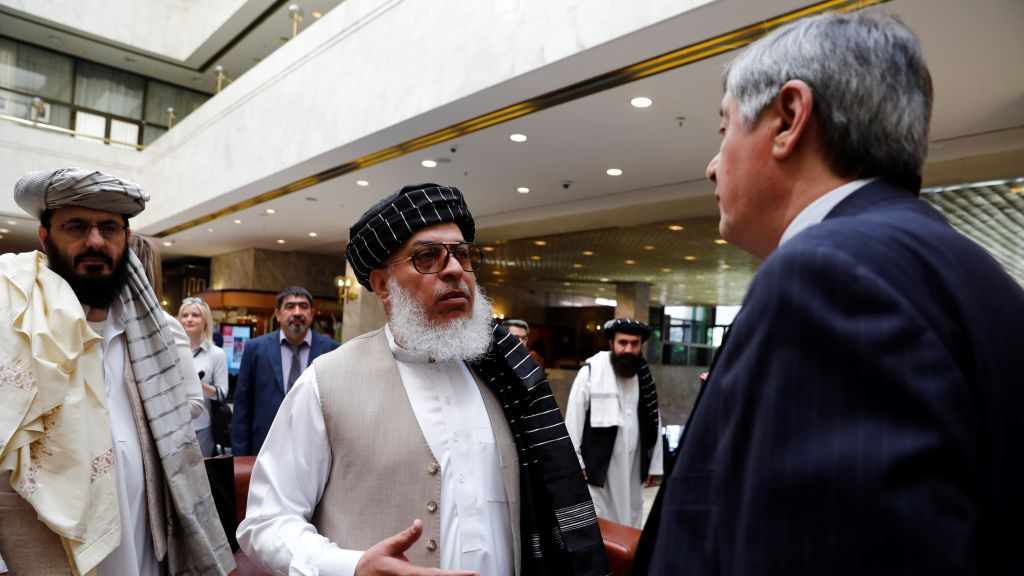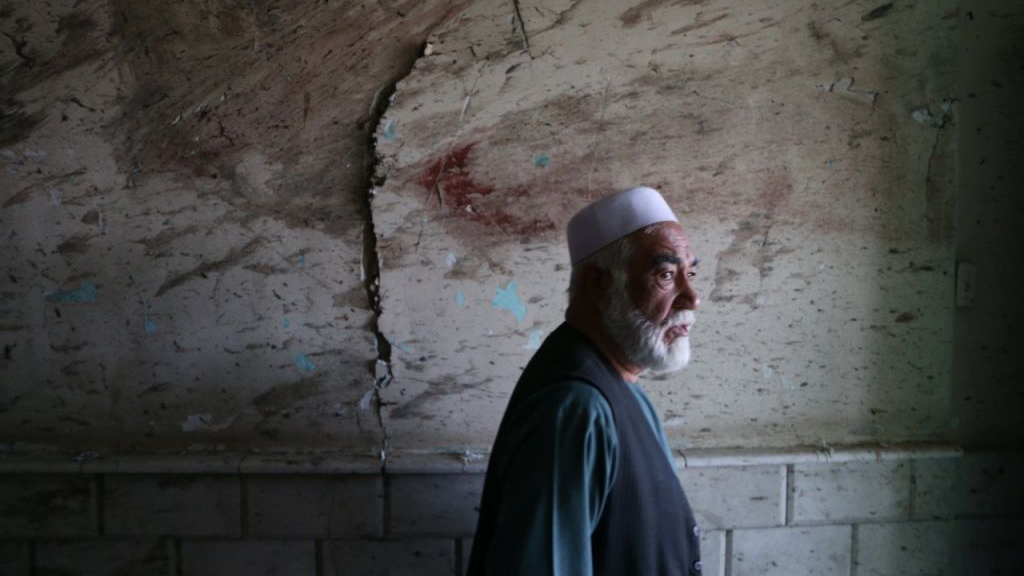
Representatives of Taliban led by Sher Mohammad Abbas Stanakzai chat with Russian presidential envoy to Afghanistan Zamir Kabulov (R) prior to Afghan talks within a conference marking a century of diplomatic relations between Afghanistan and Russia in Moscow, Russia, May 28, 2019. /Getty
Representatives of Taliban led by Sher Mohammad Abbas Stanakzai chat with Russian presidential envoy to Afghanistan Zamir Kabulov (R) prior to Afghan talks within a conference marking a century of diplomatic relations between Afghanistan and Russia in Moscow, Russia, May 28, 2019. /Getty
Editor's note: Andrew Korybko is a Moscow-based American political analyst. The article reflects the author's views and not necessarily those of CGTN.
October 20 will see the Russian capital host another round of talks on Afghanistan. It'll be the first gathering of the Moscow format since the Taliban took over the country in August. Prior multilateral meetings on this issue took place last month in the Tajik capital of Dushanbe between the Russian-led Collective Security Treaty Organization (CSTO) and the Shanghai Cooperation Organization (SCO). What's unique about the Moscow format though is that it'll also involve the Taliban and India, the first of which will represent the country's new de facto government while the second had hitherto refrained from formally participating in such talks.
Russian Presidential Envoy for Afghanistan and Director of the Russian Foreign Ministry's Second Asian Department Zamir Kabulov earlier tempered expectations by saying that he doesn't anticipate any breakthroughs. Nevertheless, this event is still significant for several reasons. First, it represents the participants' symbolic acknowledgment that the Taliban are Afghanistan's de facto leaders who must be pragmatically engaged in the interests of peace and stability. This is an especially striking observation when it comes to India and Iran, which have been very suspicious of the group since its takeover of the country.
Second, the participants understand the urgency of averting Afghanistan's impending humanitarian crisis. Failure to act can lead to large-scale refugee flows into the neighboring countries and potentially as far beyond as the EU. It can also destabilize the fragile situation in the post-war country and thus create space for terrorist groups like ISIS-K, ETIM and others to expand. The Moscow format is therefore likely to discuss practical means for addressing these concerns without extending formal recognition of the Taliban. A possible formula could be promises of additional aid in exchange for the Taliban making good on their prior promises of reform.
These involve the group becoming more ethno-politically inclusive and respecting the rights of women. Not much progress has been made on the first such promise after the Taliban promoted its fellow members without proportional regard for the country's ethnic diversity like most external stakeholders expected, while the second has made gradual inroads insofar as the group promised to allow women to continue receiving an education and working in certain spheres. Even so, some countries feel uncomfortable about extending more humanitarian aid without more progress being made on these fronts.

A scene after a bomb blast during Friday prayers at a Shiite mosque in Kandahar, Afghanistan, October 17, 2021. /Getty
A scene after a bomb blast during Friday prayers at a Shiite mosque in Kandahar, Afghanistan, October 17, 2021. /Getty
Aid shouldn't simply be dispersed but should be sustainable and meaningfully assist Afghanistan's post-war reconstruction. This mutually beneficial vision could see the Moscow format countries considering ways in which to invest in the Afghan economy in order to bring this about. For example, some of them might consider building facilities to manufacture winter clothes and other essential goods. This could provide much-needed products at affordable costs as well as employment. Another possibility is expanding Pakistan's famous 10 Billion Tree Tsunami program into Afghanistan with international support to combat climate change.
Expanding upon this economic dimension, the talks might also touch upon February's agreement between Pakistan, Afghanistan and Uzbekistan to build a railway between them that can be referred to as PAKAFUZ after each of the participating countries' first letters. This prospective corridor would complement the Belt & Road Initiative (BRI) as well as eventually connect Russia, Pakistan, and perhaps one day India as well. Most immediately, its construction would provide employment while its completion would establish a new route for connecting Afghanistan with the global economy. That would surely accelerate its post-war reconstruction.
The final issue that'll probably be discussed involves the Taliban's regional security capabilities. The group pledged to stop the drug trade and contain terrorist threats within the country. It'll require international support to replace profitable opium crops with agricultural ones in order to prevent such farmers from falling into poverty and possibly becoming susceptible to terrorist recruitment. As for the anti-terrorist dimension, ISIS-K's recent suicide attacks have raised worries that the Taliban are struggling to ensure domestic security. Those external stakeholders with intelligence assets in the country might consider sharing info with the Taliban.
Once again, it needs to be emphasized that nobody should get their hopes up about this week's Moscow format talks. A breakthrough is unlikely, but progress of some sort will nevertheless be achieved, even if the outcome isn't immediately visible and remains mostly in the realm of an emerging political consensus on Afghanistan's future. Russia's hosting of this event confirms its responsible role as a regional leader and speaks to its desire to ensure stability in this pivotal space between Central, East, South, and West Asia. The participating countries are showing the world that they intend to succeed where the U.S. failed.
(If you want to contribute and have specific expertise, please contact us at opinions@cgtn.com.)

